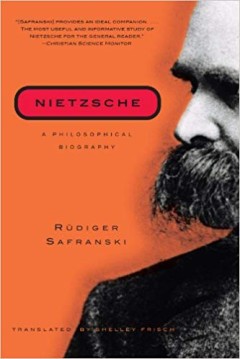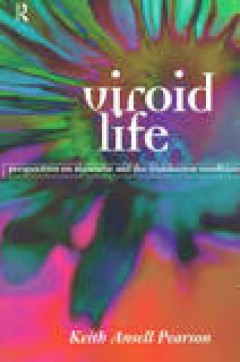Ditapis dengan

Nietzsche: A Philosophical Biography
No other modern philosopher has proved as influential as Friedrich Nietzsche (1844-1900) and none is as poorly understood. In the first new biography in decades, Rüdiger Safranski, one of the foremost living Nietzsche scholars, re-creates the anguished life of Nietzsche while simultaneously assessing the philosophical implications of his morality, religion, and art. Struggling to break away fr…
- Edisi
- First Published
- ISBN/ISSN
- 0-393-32380-3
- Deskripsi Fisik
- 412 pgs.; 21 cm.
- Judul Seri
- -
- No. Panggil
- 193 SAF n

Nietzsche Humanist
A comprehensive general introduction to Nietzsche and summary interpretation of his thought. A vast array of scholarship has been compressed here in service of an argument that is important for readers of Nietzsche at any level. The book contextualizes the thinker in terms of his life, his self-understanding, his concerns as he himself most directly expressed them, and much recent scholarship…
- Edisi
- First Published
- ISBN/ISSN
- 0-87462-614-5
- Deskripsi Fisik
- 214 pgs.; 21,5 cm.
- Judul Seri
- -
- No. Panggil
- 193 PAV n

Nietzsche and Metaphysics
Michel Haar assesses the overcoming of metaphysics urged by Nietzsche. Pointing out that Nietzsche's overcoming must be conceived as a task both critical and reconstructive, Haar shows how Nietzsche criticizes philosophical concepts as being traceable to a process of simplification and identification, thus subverting traditional categories and identities. Haar presents Nietzsche as an aestheti…
- Edisi
- First Published
- ISBN/ISSN
- 0-7914-2787-0
- Deskripsi Fisik
- xiii + 214 pps.;
- Judul Seri
- -
- No. Panggil
- 193 HAA n

Viroid Life: Perspectives on Nietzsche and the Transhuman Condition
Nietzsche's vision of the 'overman' continues to haunt the postmodern imagination. His call that 'man is something that must be overcome' can no longer be seen as simple rhetoric. Our experiences of the hybrid realities of artificial life have made the 'transhuman' a figure that looks over us all. Inspired by this vision, Keith Ansell Pearson sets out to examine if evolution is 'out of control'…
- Edisi
- -
- ISBN/ISSN
- 0415154340
- Deskripsi Fisik
- xi + 203 pg.; 23,5 cm.
- Judul Seri
- -
- No. Panggil
- 128 PEA v
 Karya Umum
Karya Umum  Filsafat
Filsafat  Agama
Agama  Ilmu-ilmu Sosial
Ilmu-ilmu Sosial  Bahasa
Bahasa  Ilmu-ilmu Murni
Ilmu-ilmu Murni  Ilmu-ilmu Terapan
Ilmu-ilmu Terapan  Kesenian, Hiburan, dan Olahraga
Kesenian, Hiburan, dan Olahraga  Kesusastraan
Kesusastraan  Geografi dan Sejarah
Geografi dan Sejarah